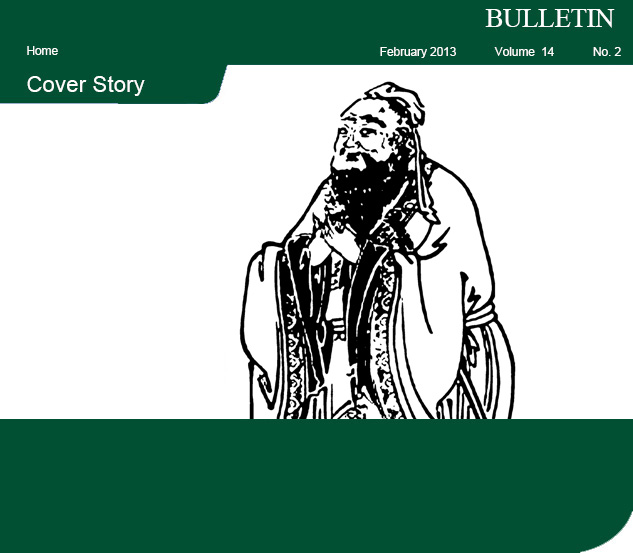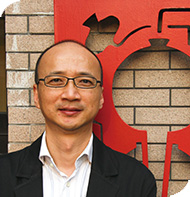| Breaking the Impasse |
|
| Politics is polarised in much of the West and at a crossroads in the East. Injecting Confucian values into modern political life could offer a way forward, says Professor Joseph Chan. |

|
Consider two scenarios. In the US politicians have pushed the country to the fiscal cliff more than once in recent years because of an inability to reach a compromise. In China, the discrediting of Marxism has left the country without a strong philosophical compass and it is vacillating between Western liberalism and traditional values to fill the void. Where can they go? Professor Joseph Chan, Head of Politics and Public Administration, has spent much of the past decade contemplating the state of the world and how to bring a new understanding to modern society. His framework has been Confucianism, which promotes different values from the West but which he says could combine well with modern concepts such as human rights, democracy and the separation of powers. “I want to give Confucianism a modern twist so that this traditional system of thought can mesh with modern aspirations and values – so Confucianism can become a source of inspiration for modern people,” he says. “My ultimate interest is the larger picture of modernity and tradition. Modernisation has been so powerful an engine that traditional schools of thought have been put to the sidelines. I think this is a worrying sign. The ancients captured great insight about human wisdom and human virtue. If we simply focus on certain narrow individual moral Western values like freedom, equality and democracy, and base our society and politics completely on these pillars, we risk losing a great deal of these traditional insights.” A place for human rights Confucianism has particular potential to contribute to modern thought because although it does not focus on the individual, it contains ideas that are compatible with modern thought, he says. “Confucianism has a great deal of very universal secular elements in its ideas on ethics and understanding of human life: respect for education and the elderly; the importance of family and of rituals; meritocracy; the ideas that the state should care for the people and that political authority ultimately depends on people’s voluntary acceptance.” “Having said that, in the ideal scenario Confucianism would not place much emphasis on rights or human rights because in the ideal situation, people behave virtuously. Their behaviour is guided by rituals and moral norms which emphasise reciprocity and care and respect. There is no need to recourse to the assertion of rights.” “Only when relationships break down completely and people reject rituals and set aside virtues, would Confucianism have recourse to the instrument of rights.”
|
 |
“For China my message is we can use Confucian resources to develop a modern political regime that is built upon institutional pillars like democracy, the separation of powers and human rights.” |
||
| Professor Joseph Chan |
|
Fallback position Human rights therefore are regarded more as a fallback apparatus – a concept seemingly at odds with the modern world where people have become quick to assert their rights. Confucianism instead starts with relationships. Professor Chan cites the example of a mother who reads her daughter’s mail to find out more about her life. In the West, the daughter might immediately object that her mother had no right to read her mail. In Confucianism, she would start by telling her mother she could simply ask her if she wanted to know what was going on in her life. “It’s a gentle reminder rather than an assertion of rights,” he says. Rights come into the picture if there is a serious relationship breakdown that threatens someone’s self-interest, such as a husband abusing his wife. Rights also have a special role to play in the relationship between the government and its citizens. “In society writ large, state officials and the people are less intimately related, which is all the more reason to expect that sometimes relationships won’t run smoothly. There is also a strong imbalance of power between the parties. So I think Confucianism would be more ready to say it’s more important to have a robust system of political and civil rights to protect citizens. Hope for the better, prepare for the worst and build a foundation to protect citizens against state abuse.” Confucianism in modern China This message is particularly appropriate for China, which has been conflicted about Confucianism for much of the past century. For many years, especially during the Cultural Revolution, Confucianism was rejected as feudalistic and backwards. In recent years there has been a revival, with some of the revivalists thinking Confucianism in its traditional form is fine as it is and does not need updating. Professor Chan clearly disagrees. “Confucianism can borrow some workable liberal concepts like human rights and democracy to protect people’s interests when things do not fare well. It can also look at these things from a higher level and offer a completely new understanding of the roles and philosophical bases of these concepts,” he says. “For China my message is we can use Confucian resources to develop a modern political regime that is built upon conceptual pillars like democracy, the separation of powers and human rights. Confucianism not only won’t reject the use of these concepts but also welcome them. It could also help these concepts to flourish.” Professor Chan’s book Confucian Political Perfectionism: A Reconstruction for Modern Times will be published by Princeton University Press later this year. |
| Back | Next |